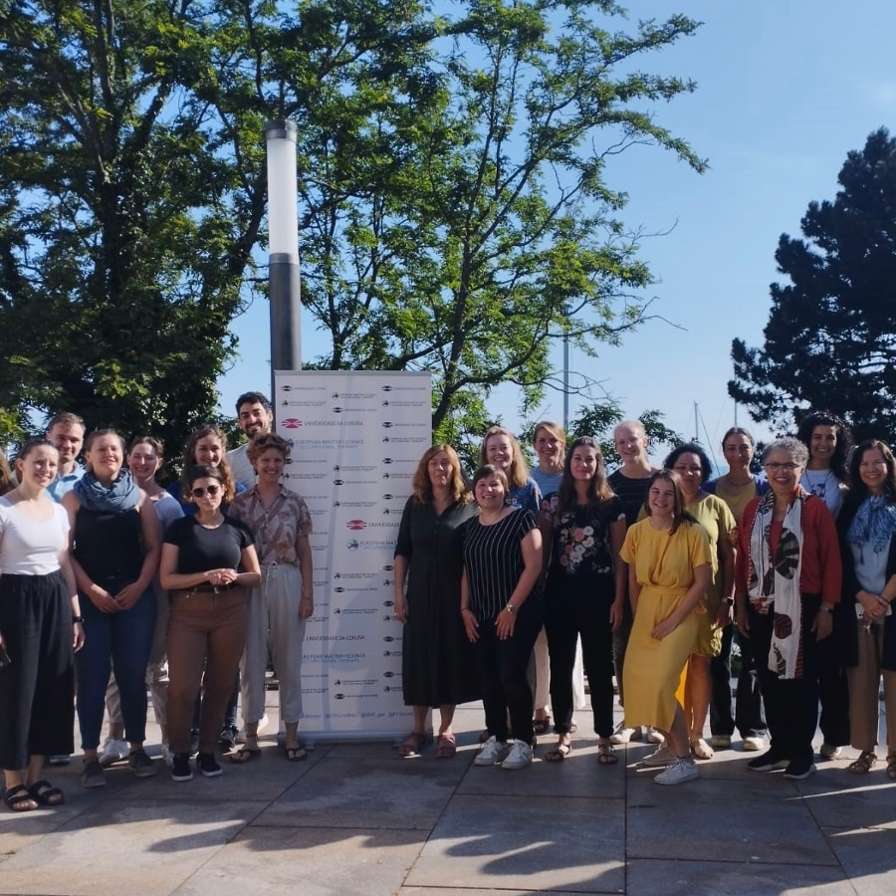Student Hannah's experience of Module 4 in Spain
Sociocultural theories blown by a breeze of sea air

Hannah Dubowy and her fellow students experienced the first module of the OT-Euromaster at the University of A Coruña. In this article, she reports on how much she enjoyed the 2 weeks on the Atlantic coast and the Spanish team's teaching.
"The module was one of my favourites," says Hannah Dubowy. The 27-year-old from Aachen has been studying in the European Master of Science in Occupational Therapy since last autumn. The first 3 modules of the programme took her to Eastbourne (UK), Amsterdam and the ZHAW in Winterthur. The fourth module has now taken them to Spain, more precisely to the University of A Coruña.
Enchanted campus by the sea
One reason for Dubowy's well-being was the Oza campus, where she and her 20 fellow students were taught. She describes the place as "cute" and "a little enchanted", with its historic building, the many green spaces, palm trees and stairs where she and her colleagues sat. In addition, the atmosphere was very familiar. They soon knew each other personally in the cafeteria, for example. The fact that the campus is only 5 minutes away from the beach was also an advantage, according to Dubowy. She was able to go to the sea with her colleagues over lunch and cool off. The water was cold. "But afterwards you were refreshed for the next lesson.
Shared accommodation in a finca
To save on expenses, Dubowy shared a flat with colleagues about 15 minutes from the campus. In the "finca-like" accommodation, they often cooked together and did activities. Thanks to the relatively low cost of living in Spain, they were often able to eat out or have a drink. "The old town of A Coruña was also very tempting for this - with its many old churches, squares, sandstone staircases and squiggles everywhere," says Dubowy. They even sat down on the famous "Praza de María Pita" to "brainstorm" for a group work with Problem-Based Learning (PBL). They also enjoyed tapas and a Tinto de Verano.
Exciting lessons in a family style
According to Dubowy, the topic of the module "Sociocultural Perspectives on Human Activity - Scientific and Theoretical Argumentation" was very practical, so that one can relate it well to one's own everyday life. In addition to the core team, consisting of four lecturers from the University of A Coruña, guest lecturers also taught - some on site, others online. Dubowy particularly remembers the Dutch occupational therapy luminary Hanneke van Bruggen, whom she found extremely inspiring, as well as Salvador Simó's input on how to market one's topics and projects to target groups. She was also very convinced by the local core team. Not only with their lectures on topics such as effective argumentation, but also with the organisation of the whole module: "Although it was only the first time, everything worked very well. She also appreciated how approachable the lecturers were and that they also introduced her to customs such as the "tapas culture".
Group work for NGOs
Dubowy found it particularly practical that they were able to do their PBL group work for a local non-profit organisation. The student groups researched the needs of refugees and developed services for this vulnerable group. During the module, representatives of the NGOs came to class again so that the students could present their interim status and ask questions. Dubowy found it particularly motivating that she was able to directly experience the reactions of the NGO people and thus learn about the strengths of occupational therapy.
Highlights in a Nutshell
According to Dubowy, the 2 weeks went by far too quickly. She particularly enjoyed the dinner with her class, lecturers and staff from the University of A Coruña, where she happened to sit next to Hanneke van Bruggen. She also liked the voluntary final evening with a picnic on the beach. What she appreciated about the module itself, apart from the warmth and openness of the lecturers, was "that we were given so much freedom for our work". The fact that the lessons did not start until 10.00 a.m. also suited her. "Since it was light for so long, the day was also not overcrowded, even if classes lasted until 6.30 pm." It was with some nostalgia that she finally said goodbye to her colleagues. However, the knowledge that the international "connection" will last beyond the end of the course gives her confidence.